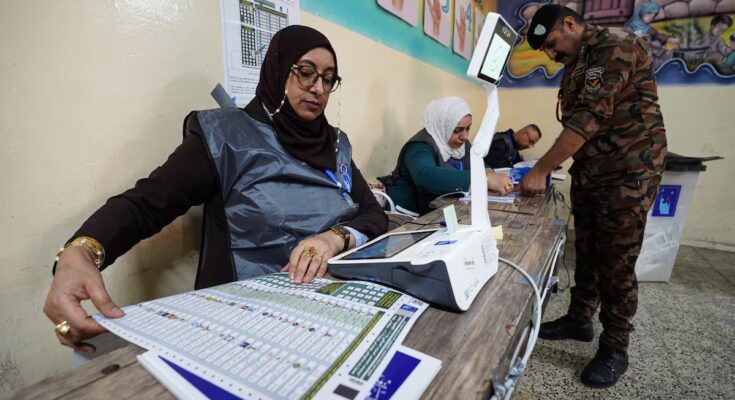Iraq has fallen into oblivion in the international press. Once the self-proclaimed Islamic State (ISIS) was defeated, the human and social destruction caused by the US occupation and the resulting sectarian civil war were eclipsed by the succession of punishing conflicts in the Middle East (Syria, Gaza, Iran…). Therefore, the withdrawal of American troops that began last summer and this Tuesday’s legislative elections went almost unnoticed. Both have the potential to distance Iraq from Iran’s network of influence.
After two long decades of intermittent presence in Iraq, the United States has agreed with the government in Baghdad to end the international coalition against ISIS, with the exception of a small contingent of advisors and instructors. The political and security connotations of the measure made it a central theme of the electoral campaign. The Shiite parties aligned with Iran, who have been pushing in this direction for some time, claim that this is a triumph of national sovereignty and speak of the “end of the occupation”. The more nationalist groups, especially Sunni, fear a resurgence of violence should pro-Iranian militias attempt to impose their power.
Since the 2003 US invasion, the Islamic Republic of Iran has projected its influence on neighboring Iraq far beyond historical, cultural and religious ties. His support for Shia-based parties and militias (the majority branch of Islam in both countries) has largely shaped Iraq’s political future. Although his control has been reduced since the US assassinated General Qasem Soleimani five years ago (who served as a liaison and glue with these groups), he still maintains support, re-evaluated by the loss of his pawns (proxy) in the rest of the Middle East.
The war in Gaza served as a pretext for Israel to weaken the capabilities of the network of Tehran-sponsored militias in the region (the so-called Axis of Resistance). In addition to decimating the Palestinian group Hamas (responsible for the October 7, 2023 attack), it inflicted severe damage on Lebanon’s Hezbollah, Houthi rebels in Yemen, members of the Revolutionary Guard in Syria, and even Iran itself, a country it ended up bombing in a humiliating operation against its nuclear facilities last June.
The Iraqi allies of the Islamic Republic are the only ones who have remained on the sidelines of the dispute and stayed out of their supporters’ conflict with Israel. It was a measure supported by Tehran, but dictated by pressure from the Baghdad government (always in a difficult balance between Iran and the USA) and, above all, by the militias’ fear of both the Israeli or American response and the internal reaction. Fed up with political tensions, Iraqis reject new foreign involvement. This climate also includes the division of the Shiite factions of the government alliance in the face of the prime minister’s efforts to dismantle the armed groups, once the departure of the American troops had been agreed upon (which justified their existence in the fight against the “occupiers”).
Indeed, in these elections, several Shiite groups that were under the government of Tehran presented opposing lists. Hence the added interest of the electoral event, the result of which will reveal how much the Iranian leader maintains his weight. The Iraqi militias are the last pawn left standing. Even if the polls reduce its approval, Iran will not give up on continuing to intervene in a country it considers part of its sphere of influence, but this would cost more and make it difficult for it to maintain the supply route to its allies in Syria and Lebanon.



